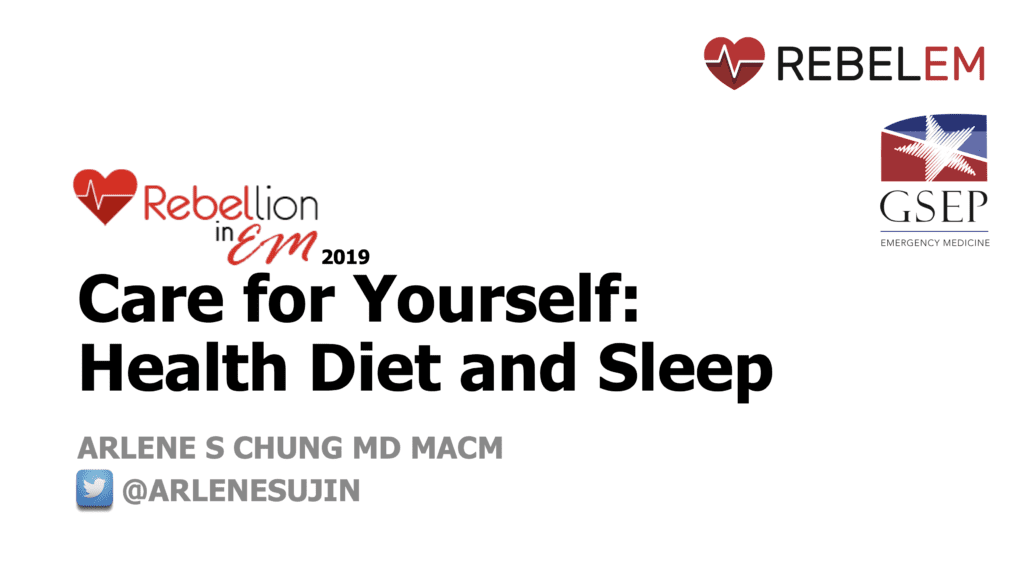
 Chronic sleep deprivation can affect health, performance, and safety. There are many causes of sleep deprivation including stresses of daily life, shift work, and unrecognized sleep disorders. In this talk from Rebellion in EM 2019, Arlene Chung, MD, facts about sleep deprivation, strategies to decrease sleep deprivation for shift workers, and reviews policy statements from the American College of Emergency Physicians (ACEP).
Chronic sleep deprivation can affect health, performance, and safety. There are many causes of sleep deprivation including stresses of daily life, shift work, and unrecognized sleep disorders. In this talk from Rebellion in EM 2019, Arlene Chung, MD, facts about sleep deprivation, strategies to decrease sleep deprivation for shift workers, and reviews policy statements from the American College of Emergency Physicians (ACEP).
Rebellion in EM 2019: Care for Yourself – Sleep Hygiene via Arlene Chung, MD
[embedyt] https://www.youtube.com/watch?v=BulGAB1yOLE[/embedyt]
Also Be Sure to Checkout our YouTube Channel

During my time working in a sleep lab, I learned quite a few facts about sleep and its history:
- Randy Gardner: 17 year old who broke the Guiness book of world records by staying awake for 11 days and 24 mins (1964)
- “On Sleep and Sleeplessness”
- First article on sleep by Aristotle (300 B.C.)
- Described a number of different ways the body reacts to sleep and vice versa
- Hypothesized that after eating, the digestive juices release fumes that travel to the brain and cause sleepiness
Allan Rechtshaffen “Disc Over Water” (1995) [1]
- Comprised of a control and intervention rat
- If intervention rat falls asleep, the disc starts to turn
- If the intervention rat does not wake up and start walking, it falls into the water and wakes up
- The control rat can sleep whenever it wants
- Rats with total sleep deprivation lost fur, developed sores in fur, paws, and mouth
Human sleep studies observing those in shift work demonstrate:
- effects of partial and total sleep deprivation
- effects of disruption of the circadian rhythm
Which can lead to:
- Decreased glucose tolerance
- Decreased fine motor skills
- Decreased concentration and memory
- Increased irritability and mood swings
- Increased risk for obesity
- Increased risk for metabolic syndrome
- Increased risk for cardiovascular disease
Meta analysis published in Obstetrics & Gynecology (2003) demonstrated:
- women who have physically demanding jobs are at an increased risk for
- Preterm labor
- Small gestational age
- Increased risk of miscarriage
- Increase in menstrual disruption
National Highway Traffic Safety Administration estimates annually:
- 72,000 crashes can be attributed to drowsy driving
- Up to 6,000 involve a fatality of up to 1 or more people involved
Shift work isn’t going away! Are we completely screwed?
ACEP policy statement: Emergency Physician Shift Work
- “The effects of rotating shifts are cumulative and represent one of the most important reasons physicians leave the specialty”
Important tip for those of us who work shift work:
- Pay attention to your sleep habits
- Wellness and wellbeing can be both a physical and mental thing
There are some things we can do to improve our own sleep health
If we were to measure brain waves after consuming caffeine, it would think it is still awake
- Try to cut out caffeine 6 hours prior to when you plan to sleep
- Create a good sleep environment
- Go pick up some black out curtains
- Try eye masks, ear plugs, white noise machines, and cool temperatures
- Do some education with family members: Mommy/Daddy is sleeping!
- Have some portion of your sleep overlap with your anchor sleep
- Anchor sleep: normal, nighttime sleep
- If shift is 2300-0700, try to sleep 2100-2300
- This will line up with your circadian rhythm and improve the quality of sleep
ACEP website has recommendations for overnight scheduling:
- Limiting shifts after a certain age
- Limiting shifts for those who are at risk for miscarriage or who have had previous miscarriages
- On call rooms for people to sleep after night shifts
Friendly reminder:
- Back in March, The Joint Commission clarified it is OKAY to have food and drink at your work stations
- “It is not a pathogen exposure to have a cup of coffee at your computer if it is not in patient care area”
References:
- Rechtschaffen A et al. Sleep deprivation in the rat by the disk-over-water method. Behave Brain Res 1995. PMID: 7546318
Post Transcribed By: Corinthia Stephanas Gonzales
Post Peer Reviewed By: Salim R. Rezaie, MD (Twitter: @srrezaie)
The post Rebellion in EM 2019: Care for Yourself – Sleep Hygiene via Arlene Chung, MD appeared first on REBEL EM - Emergency Medicine Blog.
